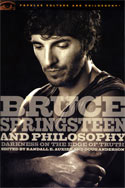July 11, 2008
Philosophy book series explores pop culture
CARBONDALE, Ill. -- Southern Illinois University Carbondale philosophy professors Randall E. Auxier and Doug Anderson make a statement just by being part of the Open Court Publishing Co.’s Pop Culture and Philosophy series.
The two recently edited one of the latest releases in the series, this one titled, “Bruce Springsteen and Philosophy: Darkness on the Edge of Truth.” Besides editing the volume, they also contributed essays to it, and assembled essays submitted by other philosophy professors and assorted intellectuals.
Other books in the series include “The Simpsons and Philosophy,” “The Lord of the Rings and Philosophy,” “Hip Hop and Philosophy,” “Poker and Philosophy,” “James Bond and Philosophy,” and “The Undead and Philosophy.”
So, what’s the statement? It isn’t so much an affirmation of the durability and value of various pop culture icons -- though it is that, too. It’s a statement that philosophy can and should have something to say about pop culture, and that pop culture has something to say back -- that pop culture, sometimes quite self-consciously, communicates philosophical ideas and concepts. It’s a statement that philosophy is not just an abstract world of ideas visited only by the degreed initiates, but that philosophy is also a living thing both shaping and being shaped by people every day.
The focus on pop culture might not seem so terribly controversial, considering there are college courses in pop culture taught at universities across the nation. However, philosophers don’t generally teach those courses. Anderson noted many academic philosophers consider dabbling in popular culture secondary, more of a hobby, not a pursuit on a par with “real philosophy.”
Then, why do it? The attraction of the pop culture and philosophy series, Auxier and Anderson agreed, is partly that it is a place where philosophers can use examples from current culture to discuss philosophical ideas and to do so seriously. This series isn’t pseudo-philosophy -- the philosophical concepts under discussion in the series are those set forth by the likes of Classic philosophers such as Socrates and Aristotle to American pragmatic philosophers such as Charles Peirce or John Dewey. The discussion may begin with Bruce Springsteen, but it may delve into a discussion about the actual definition of philosophical “pragmatism,” or differing concepts of freedom or Springsteen’s manifestation of Socratic concepts.
In addition, the series includes the American philosophical tradition, which, not coincidentally is also a focus of the SIUC philosophy department. Anderson explained that the American philosophical tradition has roots deep in humanism. It is a tradition SIUC emphasizes, rather than going along with the Analytic trend to an “apolitical and a-cultural form of philosophy,” which, he said, “abandons 90 percent of what philosophy was.” This series, he said, is a return to the humanistic philosophical tradition that distinguishes both Ancient Greek and American philosophy.
Perhaps most importantly, though, the books offer a way to introduce real philosophy to a general audience. It’s a form of teaching philosophy, which, again not coincidentally, is central to the mission of the SIUC philosophy department.
“The people who read these books tend to be well-read, and enthusiastic about the subject,” Auxier said. “They have an intuition that something is going on with the subject more than what is on the surface.”
The books are fun, and challenge the reader to see new or different ideas presented in popular television shows, books, movies or musical groups, or confirm what they thought all along.
From the writing standpoint, Auxier said, it may be fun but it isn’t easy.
“People who write for academic journals are not trained for this,” he said, with a chuckle. “Even the publisher’s guidelines stress how hard it is to do this kind of writing.”
Being a fan of the subject at hand is requisite, he said, but there’s a lot more to it than that. The book series isn’t called “(Blank)’s philosophy” -- each is called “(Blank) and Philosophy.” And that’s what distinguishes them from most other books about pop culture.
For a complete list, go to www.opencourtbooks.com and follow the link to the series.
Open Court Publishing Co. also publishes and distributes the Library of Living Philosophers, a series produced by SIUC and edited by Auxier.

